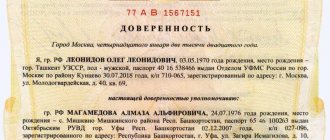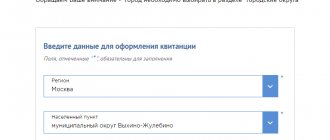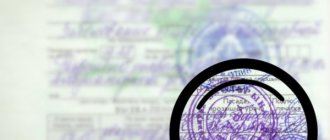Right to receive
The need to purchase a copy of a court opinion on a case may arise at any time: – both after the end of the proceedings, and after a certain period (a year, two or more).
A request for a copy of a court ruling can be sent by each participant in the process - plaintiff, defendant, third party, that is, everyone who has procedural status in the case.
In addition, persons who are not participating in the case have the right to receive a copy of the court decision, but their rights are affected by the court opinion. This category of persons has the right to file a complaint for review of the case at any stage of its consideration.
Persons who have the right of access to court proceedings due to their participation, family relationships or succession have the right not to report the reason for the need for the document. A representative of any party also has the right to request a copy of the verdict, provided that the term of his power of attorney is valid.
The following reason may be a legal basis for requesting a copy of a court opinion:
- One of the parties to the case was not present when the court verdict was announced, and therefore did not receive an extract.
- A copy of the court order is needed to send it to the bailiff authority.
- The issued extract of the decision, when the verdict was announced, was lost or became unusable.
- The need for a copy of the verdict for transfer to different structures (for example, when applying to the court with another claim).
Note. A copy of the court decision, according to the Tax Code of the Russian Federation, is issued free of charge. The requirement for payment upon receipt of a document can be interpreted as illegal, and the applicant has the right to contact law enforcement agencies.
Why is there a need to obtain a court decision?
At the end of the process, all participants in the process hear the judge announce the decision. However, as a rule, only the operative part of this verdict reaches them. To do anything, it must be put down on paper with a full narrative and all the nuances of paperwork. A copy of the court decision is necessary for each of the parties to the civil dispute, since further steps are possible only with this paper in hand. So, the document is required in the following cases:
- To the plaintiff - for presentation to the defendant and the possibility of demanding from him the fulfillment of the obligations specified in the paper.
- For the plaintiff - if, as a result of receiving the decision, no action occurs on the part of the debtor, the creditor has the right to receive a writ of execution, contact the FSSP service, which will immediately initiate enforcement proceedings and begin the process of forced collection of debt obligations from the defendant, while applying various disciplinary measures .
- This paper will also be useful to the defendant due to the fact that he may consider the court’s decision to be too strict or completely unfair. Thus, having studied the text of the document, he has the right to file an appeal against the actions of the court of first instance within the time limits provided by law.
- The same applies to the creditor, since the court, using various arguments, may not satisfy the claim in full, assigning only partial liability to the debtor, which can also provoke the filing of a complaint, but on the part of the plaintiff.
Thus, everyone who is interested in the most favorable outcome of a court case will need to have a document with the described decision of the authority in hand.
A copy of the decision of the authority
Why does this question arise?
When announcing his conclusion, the judge does not read the entire document, but only the introductory and operative sections. The motivation section is not read. Sometimes, in a simple case, a full conclusion is issued immediately after the case is closed. However, this happens occasionally.
Considering the fact that the judge may issue a full ruling with great delay, the parties to the conflict have the risk of being late in appealing the verdict. Therefore, the question of whether a request for a copy of a court verdict is necessary or not is unequivocal - it is necessary. The presence of a request means that the party to the proceeding has made every effort within its power to carry out subsequent actions.
How to write an application for a court decision
As noted earlier, any court case ends with the announcement of a court verdict, and persons participating in the dispute proceedings have the right to request a copy of the decision.
As a rule, the full text of the court verdict is drawn up much later, after it is announced at the court hearing. This especially applies to complex cases. Justices of the peace issue the full text of the verdict only after a corresponding request.
This is why a request must be made to obtain a copy of the verdict. The presence of this document encourages the judge to complete his decision more quickly.
It should be noted that various circumstances may occur in life, as a result of which a copy of the court ruling may be required. A request for it can be sent at any time, even several years after the closure of the case.
To purchase a copy of the verdict, you must be a participant in the process. This circumstance is reflected when drawing up a request for its extradition, since this is controlled by the court. Third-party citizens have the right to request a copy if this is regulated by law (for example, in case of family ties in the matter of receiving an inheritance).
There are no special requirements for filling out an application for a copy of the verdict. The rules for filing a claim can be used as a sample.
The request must be submitted in writing. Its text must display the following:
- The following information is displayed at the top right of the sheet:
- The name of the judicial authority to which the request is sent.
- Information about the participant in the case who asked for a copy of the verdict displaying the contact information of the person applying (address and telephone number to notify about the readiness of the document).
- Date, verdict number and other information on the case, a copy of which the applicant wishes to purchase.
- Next, in the center of the line, fill in the title of the document “Application for the issuance of ...”
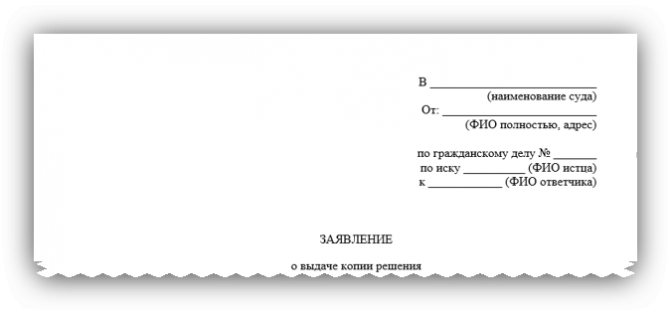
- The preamble of the request requires information about the case indicating the essence of the dispute under consideration.
- Then display the reason for the need for a copy of the document, for what purpose the document is needed.
- It is imperative to indicate whether the applicant has applied for a copy previously. If yes, what happened to the previously received document.
- Display a link to regulations that give the right to request the requested copy.
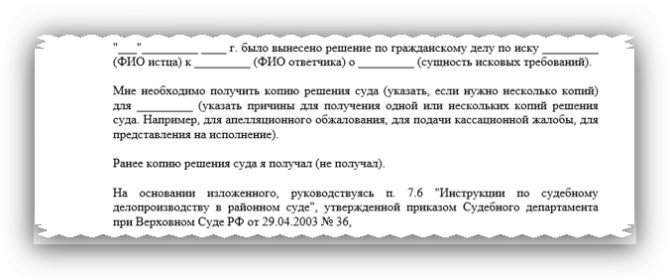
- The next point is to request the issuance of the specified copy “I request...” and then display the request indicating its essence and the number of copies required.
- At the end of the letter, the date of completion and the signature of the author of the request are indicated.
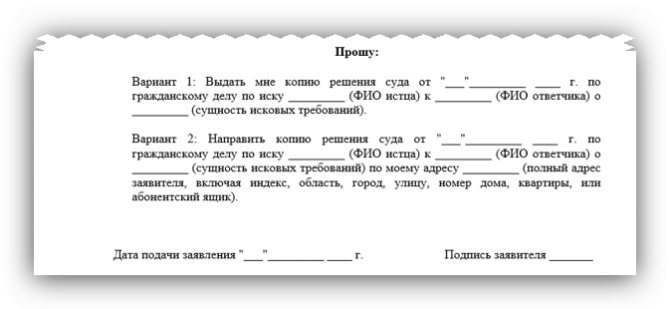
Note : It is not necessary to display all parties to the trial in the text of the request, since they do not have the right to prevent the issuance of a copy of the judge’s opinion. Moreover, the parties are not even notified of such a requirement.
Sending a request is carried out in the following ways:
- By personal arrival at the court office (the request is handed to the court receptionist).
- By mail with an enclosed list of materials. When sending this way, you must add a copy of the sender’s passport to the request.
The request is registered in accordance with the general rules of office work in court. A copy is issued after the visa of the chairman of the judicial structure is issued.
When submitting a request, it is advisable to display the method for obtaining a copy of the decision:
- By visiting the office at the specified time.
- By postal mail to the address indicated by the applicant.
- By electronic communication, if the court has such an option.
In practice, court clerks can issue an extract within a few hours.
Refusal to satisfy a request is possible only if the applicant is not a participant in the process.
Document structure
The structure of a request for a copy of a court ruling looks standard and is practically no different from the structure of a statement of claim.
The request can be filled out manually, but in practice, in most cases, the document is typed on a PC and then printed on a printer.
The document includes the following sections:
- “Header” , which displays:
- Name of the judicial structure.
- Information about the applicant (full name, address, telephone or other contact elements).
- Date and number of the court order.
- A reasoned section that sets out the reason for the application, the purpose of using the required document and a link to legislative acts giving the right to receive the document.
- Petition section , which displays the essence of the request, indicating the number of copies of the court verdict required.
- Conclusion . The final part contains the date of the request and the signature of the applicant.
A request for an extract from a court decision is written to the judge who presided over the case. If he no longer works here, then - in the name of the chairman of the court.
The Supreme Court explained the nuances of issuing a duplicate writ of execution to a new claimant
The Supreme Court of the Russian Federation published a Ruling dated October 27, 2021 in case No. 64-KG20-6-K9, in which it considered a dispute regarding the issuance of a writ of execution to the assignee in a civil case for debt collection under a loan agreement concluded between the assignor and the debtor.
In January 2014, the court recovered over 197 million rubles from Dmitry Plotnikov. debt under a loan agreement in favor of Sberbank PJSC. A few months later, on the basis of a court decision, enforcement proceedings were initiated, within the framework of which 163 thousand rubles were recovered from the debtor. Subsequently, the enforcement proceedings were completed due to the citizen’s lack of property that could be foreclosed on.
Subsequently, Sberbank transferred to LLC Megasakh, under an agreement for the assignment of rights of claim (cession), a credit file for Dmitry Plotnikov, which did not contain the original writ of execution. Although the replacement of the claimant was confirmed in court, the bailiff service sent a writ of execution to the original claimant represented by the bank, which it reported to the Megasah company. Next, the company applied to the court for the issuance of a duplicate writ of execution as part of the case regarding the bank’s claim against Dmitry Plotnikov for termination of the loan agreement, early collection of debt under the loan agreement, and collection of legal expenses.
The court refused to satisfy the request, citing the fact that the period during which the writ of execution could be presented for execution expired on July 6, 2021. As the first instance explained, the company’s application was received three days after this date (i.e. outside the established three-year period for presenting the writ of execution for execution), while it did not contain a request to restore the missed deadline for presenting the writ of execution for execution. The appeal agreed with these conclusions, but indicated that the deadline for presenting the writ of execution for execution expired on April 20, 2021. Subsequently, the cassation upheld the decisions of the lower courts.
In its cassation appeal to the Supreme Court of the Russian Federation, the Megasakh society challenged the judicial acts as illegal.
After studying the materials of the case, the Judicial Collegium for Civil Cases of the Supreme Court noted that the parties did not dispute the loss of the original writ of execution. The highest court reminded that in case of loss of the original writ of execution or court order (executive documents), the court that made the decision that issued the court order may, at the request of the claimant or bailiff, issue duplicates of such documents (Part 1 of Article 430 of the Code of Civil Procedure of the Russian Federation ). An application for the issuance of a duplicate of a writ of execution may be submitted to the court before the expiration of the period established for the presentation of a writ of execution for execution, except in cases where such a document was lost by a bailiff or other person carrying out the execution and the recoverer became aware of this after the expiration of the term established for the presentation of a writ of execution for execution.
In these cases, the Supreme Court explained, an application for the issuance of a duplicate of the writ of execution can be submitted to the court within a month from the day the claimant became aware of the loss of the writ of execution. In turn, writs of execution issued on the basis of judicial acts, in some cases, can be presented for execution within three years from the date of entry into force of the judicial act. The period for presenting the writ of execution for execution is interrupted: by the presentation of the writ of execution for execution; partial execution of the writ of execution by the debtor. After the break, the period for presenting the writ of execution for execution is resumed.
The time elapsed before the interruption of the term is not counted towards the new term (Part 2 of Article 22 of the Law on Enforcement Proceedings). If the writ of execution is returned to the claimant due to the impossibility of its execution, the period for presenting the writ of execution for execution is calculated from the date of such return. When a writ of execution is returned to the claimant due to the impossibility of its execution (including partially), the period of enforcement limitation begins anew from the day of such return.
The Supreme Court also noted that a procedural action for which a procedural deadline has been established can be completed before 24 hours of the last day of the deadline. If the complaint, documents or sums of money were submitted to the postal service organization before 24 hours of the last day of the deadline, the deadline is not considered missed.
The court noted that, as follows from the material and court decisions, the application for the issuance of a duplicate writ of execution was submitted by the company through the postal service organization on July 5, 2021. Taking into account the return of the writ of execution to the claimant on July 6, 2016 and in accordance with Part 3 of Art. 22 of the Law on Enforcement Proceedings, the period during which the writ of execution could be presented for execution expired on July 6, 2021. “Under such circumstances, the conclusions of the courts that the three-year period for filing an application for the issuance of a duplicate writ of execution was missed by the Megasakh company ” and expired on April 20, 2021, are erroneous and not based on the law,” the Supreme Court concluded, canceling the judicial decisions and returning the case for a new trial at the first instance.
Aleksey Sharon, Third Class Advisor to Justice of the Russian Federation, Chairman of the Board of the Regional Public Organization “Association of Veterans of the Bailiff Service”, believes that in the case under consideration, the Supreme Court corrected a trivial error. “After studying the texts of the decisions of the lower courts, we can conclude that none of the courts delved into the seemingly very simple rules for calculating the time limits for filing applications for the issuance of a duplicate writ of execution. Moreover, no one, except the Armed Forces of the Russian Federation, bothered to present in their decision a calculation of deadlines that could be verified,” he noted.
According to the expert, an application for the issuance of a duplicate writ of execution can be submitted before the expiration of the deadline for its presentation for forced execution. “In this case, due to the fact that the enforcement proceedings were completed by the bailiff with a certificate of impossibility of collection on July 6, 2021, therefore, the deadline for its presentation expired on July 6, 2021. The applicant submitted an application for the issuance of a duplicate writ of execution on the last day expiration of the period - July 5, 2021. How the court of appeal came to the conclusion that such a period expired on April 20, 2021, the second instance did not disclose in its judicial act,” emphasized Alexey Sharon.
Anton Grachev, a lawyer in the Arbitration practice of the law firm VEGAS LEX, believes that the ruling of the Supreme Court develops the approach enshrined in the law to calculating the period for filing an application for the issuance of a duplicate writ of execution and directs the courts to more carefully establish the circumstances of the expiration of the specified period, taking into account the method of filing an application for the issuance of a duplicate writ of execution leaf. “In particular, the Supreme Court of the Russian Federation indicated that when determining the deadline for filing an application for the issuance of a duplicate writ of execution, it is necessary to take into account the date of sending the corresponding application to the court of general jurisdiction (in the case when the sending was made by mail), and not the date of receipt of the specified application to court,” he noted.
According to the expert, in judicial practice in cases of issuing a duplicate of a writ of execution, Part 3 of Art. 108 of the Code of Civil Procedure of the Russian Federation, on which the Supreme Court relies, is used quite rarely; courts rarely pay attention to the date when the application for the issuance of a duplicate writ of execution was actually sent to the court. “It seems that the position set forth in the ruling of the RF Armed Forces under consideration will contribute to a more detailed study of these circumstances and will provide the applicant with more opportunities to exercise his rights to obtain a duplicate of the writ of execution,” summarized Anton Grachev.
Director of the Presumption CA Philipp Shishov believes that in the case under consideration, the Supreme Court of the Russian Federation, sharing the position of the claimant, focused on only one argument, namely the rule of law that the procedural deadline is considered to have been met by the party to the case when sending a procedural document by mail before the deadline (July 5, 2021). “It doesn’t matter when the document was received by the court by mail, the date of filing the document for the purpose of calculating deadlines is considered to be the date of sending by mail,” he emphasized.
According to the expert, after reading the text of the ruling of the RF Armed Forces, a number of questions arise, namely: for what reason did the bailiff not return the original writ of execution to the claimant for more than three years (from the end of the enforcement proceedings on July 6, 2021 to June 25, 2021 )? At the same time, the claimant himself believed that the writ of execution had been lost and was forced to apply to the court for the issuance of a duplicate of the writ of execution. This circumstance, including the untimely return of the writ of execution to the claimant by the bailiff service, undoubtedly should also have been taken into account when considering the case by lower courts,” Philip Shishov is convinced.
He added that in the commented ruling of the Supreme Court there is a mention that the lower courts considered the expiration date of April 20, 2021, however, from the text of the judicial act of the highest court, it is unclear what exactly the courts were guided by when determining this date, that is, an exhaustive no assessment was given of this circumstance. “The Plenum of the Supreme Court, in its Resolution No. 23 of December 19, 2003, gave a guiding explanation that the decision is an act of justice that finally resolves the case, its operative part must contain comprehensive conclusions arising from the factual circumstances established in the reasoning part . Such a resolution of the Plenum of the RF Armed Forces is certainly applicable to other judicial acts, in addition to the decision,” the lawyer emphasized.
Deadline for issuing a copy and sample
The procedure for issuing copies of court decisions is determined by regulations of judicial structures or rules for issuing materials approved by the chairmen of judicial institutions, which are drawn up on the basis of a decision of the Supreme Court of the Russian Federation.
The time for preparing an extract from the judge’s decision cannot be more than five days from the date the court office receives the request.
The five-day period includes the following actions performed by employees of the judicial institution:
- Imposing a visa from the chairman of the court to issue the requested entry.
- Requesting a case from the court archive.
- Preparation of a copy and its design in accordance with the standards.
The countdown of the time for satisfying a citizen’s request is carried out from the day of registration of the applicant’s accepted request until the moment the applicant actually receives a copy, or until the date the copy is sent to him by post.
Application for the production of a reasoning decision of the court of the agrarian and industrial complex of the Russian Federation
The decision of the arbitration court in a case considered in summary proceedings is made immediately after the hearing of the case by signing the operative part of the decision by the judge and attached to the case. The operative part of the decision adopted based on the results of the consideration of the case is posted on the official website of the arbitration court on the Internet information and telecommunications network no later than the next day after the day of its adoption.
Decisions on cases arising from administrative and other public legal relations and considered through summary proceedings are made by the arbitration court according to the rules provided for in Articles 201, 206, 211 and 216 of this Code. 2.
At the request of a person participating in the case, in a case considered under summary proceedings, the arbitration court
Is it possible to do without an application for a copy of the court decision?
To purchase a copy of the court verdict, you must submit a written request.
An extract from the decision can be issued both before the verdict is assigned legal status and after. A note to this effect is made in the text of the issued copy. Participants who were not present when the verdict was announced are sent an extract from the court verdict without submitting a request.
Other persons are required to send to the court, in order to obtain an extract from the original verdict, a request, either during a personal visit to the court office, or by mail. Copies of documents are issued by the court free of charge from January 1, 2013.
